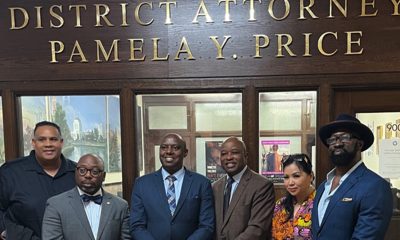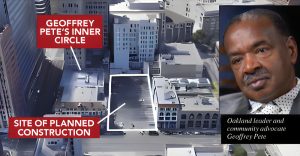World
Rival Forces Fight over Key Sites in Burundi’s Capital

Demonstrators celebrate what they perceive to be an attempted military coup d’etat, with army soldiers riding in an armored vehicle in the capital Bujumbura, Burundi Wednesday, May 13, 2015. Police vanished from the streets of Burundi’s capital Wednesday as thousands of people celebrated a coup attempt against President Pierre Nkurunziza. (AP Photo/Berthier Mugiraneza)
Andrew Njuguna and Melanie Gouby, ASSOCIATED PRESS
BUJUMBURA, Burundi (AP) — Gunfire and explosions rang out Thursday as military forces backing an attempted coup against President Pierre Nkurunziza battled troops loyal to him over key sites in Burundi’s capital, while his office reported he had returned to the country.
Weeks of turmoil in this impoverished Central African country boiled over Wednesday when an army general announced that Nkurunziza was being ousted.
The president was in Tanzania at the time for a meeting with regional leaders about the political crisis. Late Thursday, his office announced on Twitter that Nkurunziza was back in Burundi, although the report could not be independently verified.
The report also said Nkurunziza saluted the patriotism of the police and the patience of the Burundian people. His office had earlier said he had urged calm and said the situation was under control.
Shooting and explosions could be heard in central Bujumbura as loyalist troops guarding the national broadcaster RTNB exchanged fire with forces believed to support Maj. Gen. Godefroid Niyombare, the senior army officer leading the coup attempt.
The RTNB building and its surroundings were under attack for about 25 minutes, presidential communication adviser Willy Nyamitwe said on Twitter. State radio was playing music after going briefly off the air amid the fighting.
Following one of the clashes, the body of one of the soldiers who supported the coup lay on the edge of a road near the state radio station as troops loyal to Nkurunziza looked on. Police patrolled a deserted major road and some civilians walked timidly down another street, carrying a cross to show neutrality.
The military is divided between supporters of Nkurunziza and Niyombare, who was fired in February as intelligence chief. The army chief of staff, Maj. Gen. Prime Niyongabo, said on state radio late Wednesday that he was against Niyombare.
A grenade attack Wednesday night seriously damaged the building of private broadcaster Renaissance TV, where Niyombare made his coup statement, said the station’s director, Innocent Muhozi, who added that one of his offices was also burned overnight.
Police withdrew from the streets of Bujumbura after Niyombare’s coup statement, and people thronged Bujumbura’s streets and applauded soldiers who rode by in tanks and trucks.
At least 15 people have been killed in demonstrations since April 26 over Nkurunziza’s bid for a third term. Protesters say his candidacy violated the Constitution as well as peace accords that ended a civil war.
During the unrest, the military acted as a buffer between police and protesters.
Tanzania President Jakaya Kikwete, who chaired the summit on the Burundi crisis, said the region’s leaders condemned the coup and called for return to constitutional order.
Following an emergency meeting Thursday, the African Union Peace and Security Council condemned any attempts to seize power through violence in Burundi and urged talks between the warring factions.
The U.N. Security Council and Secretary-General Ban Ki-moon condemned leaders of the attempted coup for trying to oust the elected government.
The council also condemned those facilitating violence against civilians, an apparent reference to government supporters, and called for “the swift return of the rule of law and the holding of credible elections.”
Both the council and the U.N. chief, in separate statements, called for an urgent halt to all fighting and the restoration of peace. Ban stressed that anyone responsible for ordering or committing human rights violations will be held accountable, U.N. spokesman Stephane Dujarric said.
The U.N. special envoy on Burundi Said Djinnit has been in touch with various parties on the ground, and calls have been made to regional leaders, Dujarric added. He briefed the Security Council by videoconference.
Djinnit was in Nairobi and was trying to get back to Bujumbura, Dujarric said.
Burundi’s Constitution states a president can be popularly elected to two five-year terms. Nkurunziza maintains he is eligible for a third because parliament elected him to his first term, leaving him open to be popularly elected to two terms.
The U.S. government urged all sides in Burundi to end the violence and expressed full support for the ongoing work by regional leaders.
Hutus are the majority ethnic group in Burundi, making up about 85 percent of the population, while Tutsis make up the other 15 percent.
Burundi erupted into civil war in 1993 following the assassination of the country’s first ethnic Hutu president, Melchior Ndadaye. That conflict, which underscored longstanding ethnic tensions between the Hutu and the Tutsi people, lasted until 2005.
Nkurunziza, a Hutu, took over as president and embarked on a campaign of ethnic reconciliation and economic rehabilitation. In 2009, his government signed a peace agreement with Burundi’s last rebel group.
___
Associated Press reporter Elias Meseret in Addis Ababa, Ethiopia, and Cara Anna in New York contributed to this report.
Copyright 2015 The Associated Press. All rights reserved. This material may not be published, broadcast, rewritten or redistributed.
###
Community
How Mobihealth Drives a Telemedicine Revolution in Africa
As a child growing up in northern Nigeria, Dr. Funmi Adewara experienced a severe hand injury that required multiple surgeries and frequent hospital visits. These visits exposed her to the harsh realities of the country’s healthcare system. “I remember sitting in overcrowded waiting rooms, watching doctors stretched thin, unable to meet the needs of so many patients,” Adewara recalls. This formative experience ignited her passion for transforming healthcare in Africa.

By Ifeanyi Abraham
CNN
As a child growing up in northern Nigeria, Dr. Funmi Adewara experienced a severe hand injury that required multiple surgeries and frequent hospital visits.
These visits exposed her to the harsh realities of the country’s healthcare system. “I remember sitting in overcrowded waiting rooms, watching doctors stretched thin, unable to meet the needs of so many patients,” Adewara recalls.
This formative experience ignited her passion for transforming healthcare in Africa.
Growing up with a mother who worked as a nurse, Adewara’s understanding of healthcare challenges deepened through her mother’s stories.
“I knew early on that healthcare wasn’t a privilege — it was a necessity, and I wanted to be part of changing the system,” she explains.
After training as a physician, Adewara worked for 15 years in the United Kingdom’s National Health Service before founding the telemedicine platform Mobihealth in 2017.
Since its launch, Mobihealth has impacted thousands of lives, connecting patients with doctors and healthcare professionals across Nigeria and beyond.
The platform has 20 integrated telehealth clinics that offer remote consultations, diagnostics, and access to specialist care via digital health tools. Located primarily in Nigeria, these clinics are accessible to patients through various subscription plans and are often financed through partnerships with global donor organizations and private donors.
In addition to the clinics, Mobihealth has partnerships with over 200 hospitals, labs, and pharmacies, Adewara says.
The company has earned global recognition, including a $1 million grant from the U.S. Trade and Development Agency in 2022. Adewara was also one of the World Bank’s seven 2020 Sustainable Development Goals & Her award winners, selected from over 2,400 entries worldwide.
Connecting Rural Patients
Across sub-Saharan Africa, millions struggle to access basic healthcare. According to the World Health Organization, the region bears 25% of the global disease burden but has only 3% of the world’s healthcare workers.
“In rural Africa, a trip to the nearest hospital can mean the difference between life and death,” says Adewara.
Mobihealth’s latest initiative offers healthcare for $1 a month for rural and underserved populations. It allows Africans in the diaspora — and global supporters — to sponsor essential services like doctor consultations, diagnostic tests, and access to telemedicine clinics.
The scheme is not solely based on donations; individuals can also subscribe to the service for themselves.
“Healthcare systems across Africa are under immense pressure,” Adewara explains. “Our initiative is a direct response, using technology to connect rural patients with doctors thousands of miles away.”
For Adewara, Mobihealth’s telemedicine platform is not a temporary fix; it represents the future of healthcare in Africa.
“This is about creating a resilient, sustainable and inclusive system, where people, no matter where they are, can access the care they need,” she says.
“Telemedicine brings doctors to people, wherever they may be. By integrating AI and remote monitoring, we are improving the speed and accuracy of care, saving lives in the process,” she adds.
A number of African companies provide telemedicine services, but researchers have pointed out that there are obstacles that could hinder the growth of telemedicine in the continent.
Rural areas can have an unreliable electricity supply and poor internet connectivity, and there is often a lack of government policies and funding around virtual healthcare.
“A Healthcare System for the Future”
Adewara envisions scaling her company’s model to reach millions more across Africa, particularly in countries like Ghana, Kenya, and Ivory Coast.
“Our work is just beginning,” she says. “We are building a healthcare system for the future — one that is resilient, inclusive and capable of meeting Africa’s growing population’s needs.”
However, partnerships are crucial to achieving this vision. “We can’t do this alone. Our collaborations with the African diaspora, hospitals, governments, and international organizations allow us to reach more people and ensure that healthcare is affordable, efficient and accessible,” Adewara adds.
Activism
Atty General Rob Bonta Joins Coalition Backing Pres. Biden’s Migrant Parole Program
“The Biden Administration’s CHNV Parole Program provides a safe pathway to apply for protection for Cuban, Haitian, Nicaraguan, or Venezuelan migrants fleeing violence and upheaval. We urge the court to uphold this program that creates orderly processes for people fleeing humanitarian crises to lawfully reach the United States,” said California Attorney General Rob Bonta. The federal government has exercised its authority under the Immigration and Nationality Act to parole migrants into the country for humanitarian purposes since the Eisenhower Administration.

By Bo Tefu, California Black Media
Attorney General Rob Bonta joined a multistate coalition of 18 attorneys general to write an amicus brief supporting President Joe Bidens’s Parole Program for migrants fleeing violence.
The multistate coalition will submit the brief to the Fifth Circuit Court of Appeals regarding the case Texas v. U.S. Department of Homeland Security. The brief endorses Biden’s Parole Program for Cubans, Haitians, Nicaraguans, and Venezuelans (CHNV Parole Program). The migrant parole program allows individuals from the four countries to apply for advance travel authorization. Migrants can be considered for temporary humanitarian parole of up to two years including employment authorization.
The coalition highlighted California’s interest in maintaining the federal government’s discretionary power granting migrants entry or allowing immigrants to stay on humanitarian grounds.
“In California, we believe that migrants escaping violence should be treated with compassion and dignity, and immigration parole programs are a crucial part of a just and secure immigration system,” said Bonta.
“The Biden Administration’s CHNV Parole Program provides a safe pathway to apply for protection for Cuban, Haitian, Nicaraguan, or Venezuelan migrants fleeing violence and upheaval. We urge the court to uphold this program that creates orderly processes for people fleeing humanitarian crises to lawfully reach the United States,” he said.
The federal government has exercised its authority under the Immigration and Nationality Act to parole migrants into the country for humanitarian purposes since the Eisenhower Administration.
The coalition argued that the lawsuit in Texas threatened to undermine the federal government’s authority to establish crucial programs that help migrants escape unstable circumstances in their home countries.
The coalition stated that parole provides safe, legal, and orderly pathways for people to seek protection in the United States.
However, opponents claim that parole pathways help increase crime and impose costs on states.
Activism
‘Ngingubani:’ Who Am I? How DNA and Oral History Helps Black Youth Connect to Tribal Roots
‘I didn’t know who I was.’ This was not an uncommon belief for teenage boys plucked from the streets of Johannesburg, South Africa. Often disconnected from their families and living on the streets, they had little evidence of strong family ties. Maybe their story sounds familiar to you. Maybe you find yourself asking similar questions: Who am I? Where do I actually belong?

By Chelsea Trautman
‘I didn’t know who I was.’
This was not an uncommon belief for teenage boys plucked from the streets of Johannesburg, South Africa. Often disconnected from their families and living on the streets, they had little evidence of strong family ties. Maybe their story sounds familiar to you. Maybe you find yourself asking similar questions: Who am I? Where do I actually belong?
These questions were the initial inspiration for the Johannesburg Applied Ancestry Program launched in 2006 by researcher and program coordinator Clive Haydon, and Dr. Brian Hill, a university professor at Brigham Young University.
The program’s name: “Ngingubani,” or “Who am I?” in the African Zulu language, has a goal to help teenage boys between the ages of 12-16 better understand their identities by learning and sharing their own family stories.
Connect
One story included a young boy who was separated from his biological mother when he was only 5 years old. Having no written history or knowledge of his family, his story was like many at the Twilight Children’s Center in Johannesburg where the program took place.
Through outreach to extended family, program social workers were able to find this young boy’s mother and facilitate their reuniting nearly 14 years after their separation.
After being connected with unknown relatives, participants sat down for an interview to learn the stories of those who had gone before them: the boys developed a stronger sense of self after hearing their rich oral history from people who shared their blood, culture, and heritage.
Robyn Fivush, PhD and professor of Psychology at Emory University stated: “These kinds of family stories create meaning beyond the individual. To include a sense of self through historical time and in relation to family members” (Jorgenson & Bochner, 2004: Norris, Kuiack, & Pratt, 2004).
Belong
The interviews and DNA samplings gave insight about these young boy’s native ancestral tribes. While not all participants were reunited with parents, they were all still able to connect with a living relative.
Through a culminating cultural celebration, participants at the Twilight Children’s Center dressed in traditional tribal clothing, and shared dances, artwork, and personal stories from the knowledge they gained during the program. This emotional tearful event made the boys feel valued by their parents and motivated their belief in who they could become.
Become
Thanks to DNA testing and family history stories, many can now discover their heritage and find a similar connection and belonging with deceased and distant family members.
A great way to begin is by telling family stories. Tell them as they are, setting aside opinions and personal bias to allow one’s family to interpret the meaning themselves.
For information on how to start, visit: familysearch.org, or through visiting a cemetery or by celebrating an ancestor’s birthday.
The ripple effect of family storytelling has the capacity to answer “Ngingubani.”
Chelsea Trautman is a research assistant at Brigham Young University.
-

 Alameda County5 days ago
Alameda County5 days agoAlameda County District Attorney Pamela Price Announces $7.5 Million Settlement Agreement with Walmart
-
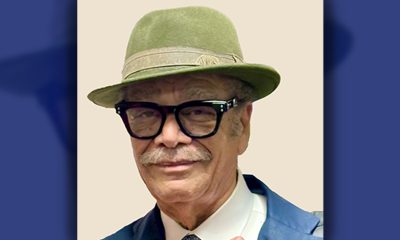
 Activism3 weeks ago
Activism3 weeks agoCOMMENTARY: DA Price Has Done Nothing Wrong; Oppose Her Recall
-
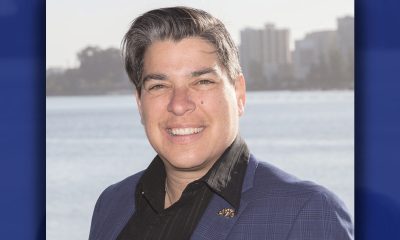
 Activism2 weeks ago
Activism2 weeks agoOP-ED: Hydrogen’s Promise a Path to Cleaner Air and Jobs for Oakland
-

 Activism3 weeks ago
Activism3 weeks agoBarbara Lee, Other Leaders, Urge Voters to Say ‘No’ to Recalls of D.A. Pamela Price, Mayor Sheng Thao
-
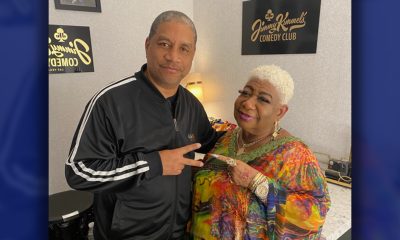
 Community2 weeks ago
Community2 weeks agoTerry T. Backs Oakland Comedy Residency by Oakland’s Luenell at Jimmy Kimmel’s Comedy Club in Las Vegas
-

 Activism3 weeks ago
Activism3 weeks agoOakland Post: Week of October 9 – 15, 2024
-

 Business2 weeks ago
Business2 weeks agoStudy Confirms California’s $20/Hour Fast Food Wage Raises Pay Without Job Losses
-

 Bay Area2 weeks ago
Bay Area2 weeks ago2024 Local Elections: Q&A for Oakland Unified School Candidates, District 3



